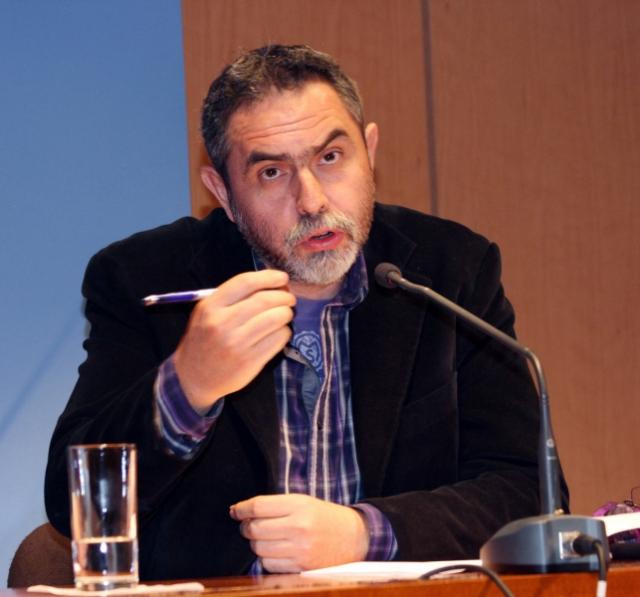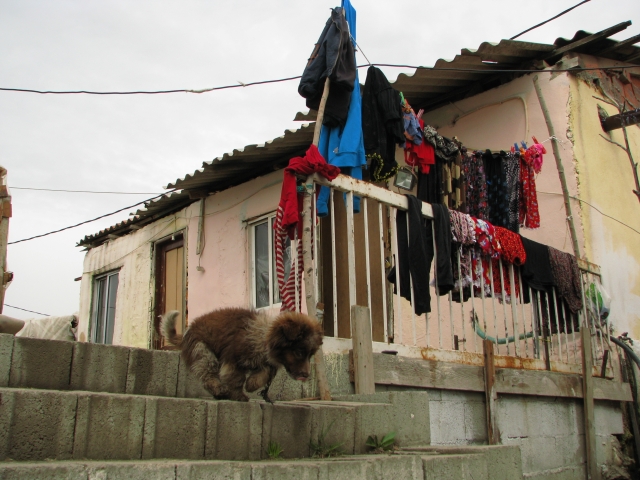Photos: Vassilis Vafidis
Anastasia Balezdrova
Maria, the girl who was found in a Roma camp in Farsala, is a child of a Roma couple from Bulgaria. The discovery has shocked the majority of the public in two ways. One regards Maria’s biological family. Too many comments on social and traditional media contained an almost racist question, namely "How could this blond and blue-eyed girl be the child of those parents?" The other, however, relates to the trafficking of babies, illegal adoption and institutional corruption that allow the flourishing of this immoral "business".
The story has uncovered something else, namely the big difference between the living conditions of the Roma in Farsala and those of Maria’s biological family in the village of Nikolaevo. GRReporter sought teacher in intercultural education at the Pedagogical Faculty of Democritus University in Komotini George Mavromatis, to answer our questions about the Roma in Greece and their way of life.
Mr. Mavromatis, are the Roma integrated in Greek society and to what extent?
Before I answer this question, I would like to clarify something. When discussing this topic, the big question always is "who are the Roma?" Are they are a biological, ethno-cultural or social group?
Assuming that they are determined biologically, what could the criteria be? Are all dark-skinned people with dark eyes Roma? Their mobility could not be accepted as a factor determining the community either, simply because other groups lived nomadic life 100 years ago too. So, nor could this be accepted as the sole criteria.
 My opinion is that the Roma are a social category in the sense that they do not have access to things that the state equally allocates to all of its citizens. When we talk about the Roma, we mean the poor and destitute people. The people who have a home, work and are of Romani origin are not the subject of this discussion because their problems are not so different from those of the majority of the population.
My opinion is that the Roma are a social category in the sense that they do not have access to things that the state equally allocates to all of its citizens. When we talk about the Roma, we mean the poor and destitute people. The people who have a home, work and are of Romani origin are not the subject of this discussion because their problems are not so different from those of the majority of the population.
We do know that today's Roma are not the descendants of the people who came to Europe from India 10 centuries ago. Many different people entered and left this group. During my lectures at the university I often tell my students that if tomorrow I find myself out of work, in the street, eating whatever I can find and if, at some point, I have a biological heir, this child will surely be Roma without knowing it.
According to the data, about 300,000 people live in Greece who are part of the so-called Roma culture, i.e. they speak Romani. There are many civil servants, police officers, doctors, engineers, priests and representatives of many other professions among them. The issue of social exclusion does not affect all the Roma in Greece. It refers to about 50,000 people who are living in conditions of absolute poverty and have no property. They are nomads and make their living through begging, with farm work or other unskilled occupations.
The most significant problem is that the civil status of these people is not regulated. The governmental institutions do not know who they are, where they are or how many they are. Many of them do not have an identity card, some have two, a third group of them are registered in more than one municipality. Roma immigrants from other Balkan countries who have arrived in Greece in various ways are moving and living along with them and due to the lack of data, the Greek state is not able to establish which of them were born here and which have come from other countries.
What are the expressions of their social exclusion?
In practice the Roma are not victims of social exclusion on the part of institutions. There is no order claiming that the Roma are prohibited from one thing or another. At the same time, however, they cannot obtain many social benefits because a person who has no documents virtually "does not exist". Therefore, many of them have no access to social benefits and this is a kind of social exclusion.
Another factor is their mobility. This continuous process of movement, which is linked to the need to find a job, prevents the Roma children from attending school classes on a regular basis. Therefore, they cannot be educated and this is not due to a ban by the institutions but by coincidence.
Of course, there are examples of social exclusion for which society is to blame. In some cases, the majority of the parents do not want the Roma children to attend the same schools as their children. In other cases, residents of the neighbourhoods do not want the Roma to stay in barracks near their homes. In addition, every time the Roma stay in someone's private property or communal areas they become victims of persecution with all the negative implications. In my opinion this would happen to everyone who is in that position, whether he or she has dark skin or speaks the Roma language or not.

However, why don’t the Roma have personal documents? What is the reason for this in your opinion?